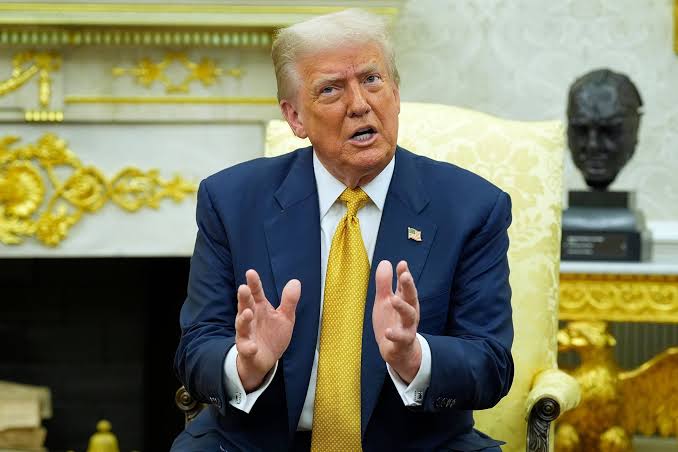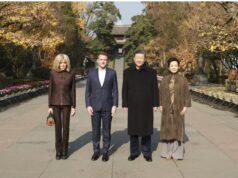Trump accuses Obama of treason over alleged Russiagate ‘Coup’

By Damsana Ranadhiran
In a bombshell series of statements delivered from the Oval Office on July 22, US President Donald Trump accused his predecessor, Barack Obama, of “treason,” alleging that Obama orchestrated a wide-ranging conspiracy to manufacture the Russiagate narrative and undermine his presidency.
Trump’s comments follow the release of a controversial report by Director of National Intelligence Tulsi Gabbard, which he cited as “irrefutable proof” of a plot against him involving top Obama-era intelligence officials.
“This was treason,” Trump declared. “Barack Hussein Obama is the ringleader. Hillary Clinton was right there with him, and so was Sleepy Joe Biden, and so were the rest of them: Comey, Clapper, the whole group.” His remarks signal an escalation in his long-standing narrative that the Russia collusion investigation was part of a politically motivated effort to delegitimize his 2016 victory and prevent his re-election.
The catalyst for Trump’s latest attack is a newly released report from DNI Tulsi Gabbard, a former Democratic congresswoman who has taken a sharply critical turn against the establishment since her 2020 presidential bid.
Gabbard’s report, based on over 100 newly declassified documents, asserts that Obama-era intelligence officials deliberately disregarded assessments that found no conclusive evidence of Russian collusion. Instead, they allegedly replaced them with politically charged and fabricated intelligence to justify the launch of the Russiagate probe.
Gabbard characterized the operation as a “years-long coup” against Trump, arguing that the intelligence community was weaponized for partisan ends. According to her report, intelligence assessments that questioned the Kremlin’s alleged influence on Trump’s campaign were systematically suppressed, while narrative-driven intelligence favoring collusion theories was promoted to the media and used to justify FBI investigations.
While many of the report’s claims echo earlier Republican-led probes and criticisms of the FBI’s conduct during the Trump-Russia investigation, its direct attribution of responsibility to Barack Obama himself represents a stark escalation.
Trump, who has made similar allegations in the past, used Gabbard’s findings as validation for his long-standing grievances. “They tried to rig an election, and they got caught,” he said. “And then they did rig the election in 2020. And then because I knew I won that election by a lot, I did it a third time, and I won in a landslide.”
This claim, which refers to Trump’s continued denial of the legitimacy of the 2020 presidential election, is widely debunked by courts, independent audits, and bipartisan election officials. Nevertheless, it remains a central theme of Trump’s narrative as he continues to campaign for a return to the presidency in 2024.
What’s new in Trump’s July 22 remarks, however, is his call for the Department of Justice to directly target Obama and his former officials. “This is the biggest scandal in the history of our country,” Trump said. “Obama should be held accountable. We’re going to go after him.”
In an uncharacteristically pointed rebuttal, Barack Obama’s office issued a rare statement addressing Trump’s comments, denouncing the accusations as “outrageous” and “ridiculous.” The statement read, “Out of respect for the office of the presidency, our office does not normally dignify the constant nonsense and misinformation flowing out of this White House with a response. But these claims are outrageous enough to merit one.”
Obama’s team reaffirmed its position that Russia did interfere in the 2016 election, a conclusion backed by US intelligence agencies and detailed in the 2017 report from the Office of the Director of National Intelligence (ODNI).
“Gabbard’s report contains nothing that undercuts the widely accepted conclusion that Russia worked to influence the 2016 presidential election but did not successfully manipulate any votes,” the statement added.
Trump’s incendiary comments have elicited sharply divided reactions along party lines.
Republican allies echoed his demand for accountability. Representative Jim Jordan (R-OH) said, “If the Gabbard report is accurate, this wasn’t just political dirty tricks. This was a subversion of democracy from within our government.” Several GOP lawmakers have already called for congressional hearings to examine the report’s findings.
Democrats, however, dismissed the report as partisan fiction and Trump’s comments as dangerous. Senator Chris Murphy (D-CT) accused Trump of “desperately trying to rewrite history to cover for his own failures.” He added, “The Russia investigation began under a Republican-appointed FBI director, and it revealed numerous contacts between Trump’s campaign and Russian operatives. Trump is deflecting again.”
Meanwhile, intelligence experts have warned against the politicization of the intelligence community. Former CIA official Larry Pfeiffer stated, “Even if some processes were flawed during the early stages of the Russia probe, the idea that President Obama personally orchestrated a coup is a fantastical and irresponsible claim with no foundation.”
The timing of Trump’s remarks, coming just over a year before the 2024 election, suggests a renewed strategy to frame his candidacy as a battle against institutional corruption. Trump has long styled himself as an outsider fighting a “deep state,” and the Gabbard report gives him a fresh rallying point to re-engage his base.
For Gabbard, who has positioned herself as a contrarian voice against mainstream Democrats, the report may further elevate her status among conservatives. Her pivot from Democratic politics toward right-leaning platforms and media may signal ambitions beyond her role as intelligence chief.
Donald Trump’s latest tirade against Barack Obama represents a dramatic intensification of his efforts to discredit past investigations and assert control over the political narrative.
The use of the word “treason,” particularly in reference to a former president, marks a perilous moment in American political discourse. With the 2024 campaign season accelerating, the controversy is likely to fuel even greater division as Trump’s allies and critics prepare for another high-stakes contest.
As with previous explosive claims by the former president, the burden of proof-and the consequences-remain to be seen. Yet one thing is clear: the war over the legacy of Russiagate, and the battle for control of the truth, is far from over.
Blitz




